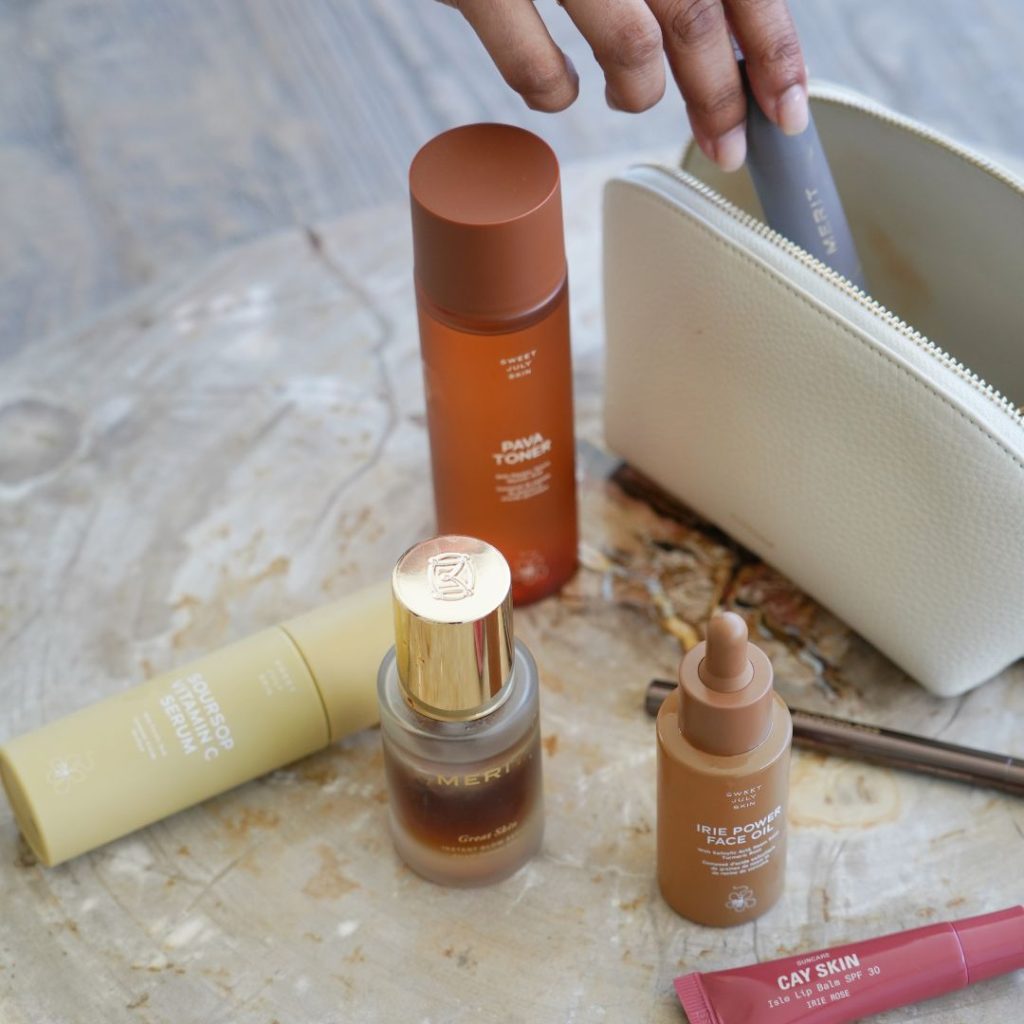Have you ever felt nostalgic for the days when all you knew about “the beauty industry” was that you loved applying your sparkly purple eyeshadow with the little foam applicator? Same. These days, it can be so hard to tell the difference between legit beauty products and scams that it completely ruins the fun of something we once did simply because we loved it. How do you know if a product is actually effective or not? How do you know if the vitamin C serum you’re buying is ethically made? When we were five, we did our makeup in front of our Barbie mirror for fun and didn’t have to worry about any of these things, so why do we do it?
It turns out that beauty marketing and packaging have a few red flags that can instantly tell you if a product is worth your hard-earned money. On the Everygirl Podcast, we spoke with Dieux Skincare founders Charlotte Palermino and Joyce de Lemos about the biggest beauty red flags that should immediately ban a product from your routine. Here’s what to look out for to keep your inner child’s joy around your beauty routine and eliminate stress.
1. Active ingredients in transparent glass packaging
Active ingredients are a big part of skincare these days, and chances are you already have one or two in your routine. From vitamin C to retinol to alternatives like bakuchiol, active ingredients in skincare are used to treat a specific concern. For example, using retinol to treat acne or combat fine lines is a common incorporation of an active ingredient into a skincare routine. However, the packaging of any skincare product that uses a powerful active ingredient is actually very important.
When looking at skincare products with powerful ingredients, make sure they come in opaque packaging. “If an ingredient is supposed to be very active, potent, and effective and it comes in clear glass packaging, that’s a no-go,” de Lemos said on The Everygirl Podcast. “That powerful ingredient is definitely going to degrade as soon as the sun hits it.” To ensure you’re getting what you paid for with your actives, they should be in protective packaging that won’t allow sunlight to damage the product. In fact, de Lemos recommends looking for products that are also protected from air, without glass droppers. Opaque packaging with an airless pump is the way to go.
2. Unrealistic statements and alarmist marketing
This should go without saying, but one skincare product isn’t going to change your entire life—or your face. There are plenty of beauty marketing tools out there, from billboards to TikTok, that would have you believe otherwise. However, if a product claims to completely eradicate your skin woes, it should set off alarm bells in your head. “The sad truth is that shame and fear are incredible motivators to purchase,” Palermino said on The Everygirl Podcast. If you see a beauty brand being super bold with their anti-aging pitch (we’re all getting older anyway, y’all!) or claiming that their product is the holy grail that will solve your lifelong struggle with hormonal acne, that’s a problem. No skincare product should scare you into buying it, so always look for brands that are as honest as possible about what their product can and can’t do. If you’re unsure, consult your dermatologist.

3. Mineral sunscreens containing too much butyl and octyl salicylate
This one is specific, but worth knowing given all the hype around chemical and mineral sunscreens on the internet recently. To sum up the drama, in 2019, the FDA proposed revising the requirements for active ingredients in sunscreens, and the internet went wild with the claim that mineral sunscreens are categorically better for you than chemical sunscreens. “The FDA asked for more information, and it was a free-for-all to demonize chemical sunscreens in order to sell mineral sunscreens,” Palermino said. “I love mineral sunscreens, but if you look at a lot of these mineral sunscreens, they have an ingredient called butyl octyl salicylate, which is an analog of a chemical sunscreen.”
In other words, if you check your 100% mineral sunscreen and it has a ton of butyl salicylate and octyl salicylate in it, it’s actually a reflection of a chemical sunscreen. While Palermino acknowledges that it’s ridiculous for consumers to be forced to be their own investigative journalists in cases like these, it’s best to at least be able to verify these ingredients. That way, you can make a truly informed decision about whether a chemical or mineral sunscreen is right for you.
4. Unregulated testing processes
The beauty industry is huge, so it’s harder than ever to know if a brand has properly vetted its products and ingredients. As co-founders of Dieux, Palermino and de Lemos are experts at carefully checking not only the ingredients in their skincare, but also the ingredients in their packaging before putting a product on the market. “We have a full audit process, not even for the final product that we put on the shelf, but there’s also a toxicology test that all the different ingredients that go into the products have to pass,” de Lemos said. Ideally, any skincare product you buy should go through multiple rounds of testing before it makes it to your bathroom.
According to Palermino, new FDA regulations on skin care product testing are necessary because it’s so easy to sell skin care products online without any testing. Of course, it’s one thing for a skin care brand to simply follow the law and another for them to go above and beyond in their testing and transparency obligations. But in an ideal world, every skin care brand would go through an audit process as rigorous as God’s. If you visit the website of the brand you’re shopping for and can’t access detailed information about their testing process, consider that a red flag.
5. Counterfeit products
We’re all familiar with the idea of a “dupe” in the beauty industry, but what happens when counterfeit products are on sale? There’s a difference between a brand mimicking another’s formula and packaging and knockoffs posing as the real thing online. When you buy a skincare product directly from the brand or at a store like Sephora or CVS, you can usually be sure that it’s not a fake. However, Palermino cautions against ordering skincare products from Amazon because it can be difficult to determine if they’re legit or not. “Buying skincare products from Amazon is usually a no for me because it’s really hard to make sure you’re not buying a counterfeit,” she said. “It’s not like you can’t buy anything from Amazon. It’s more like you’re going to have to do your due diligence.”
If you’re wondering whether a product is authentic or not, consider buying direct from the consumer. It’s definitely not worth it to scour the ingredient list on Amazon to save a few extra bucks on a potentially counterfeit product. While you shouldn’t have to be your own investigative journalist, when counterfeits are on the market, you should double-check by default. And who knows? One day, if enough brands follow God’s lead, we can hopefully go back to the real thing. amusing of beauty.
